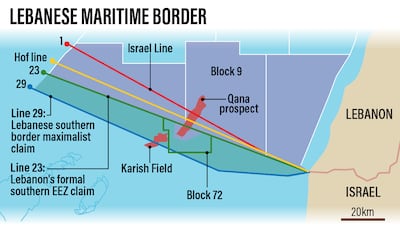Israel and Lebanon have reached a “historic breakthrough” to demarcate the maritime boundary between the two countries, US President Joe Biden said on Tuesday, praising his country's role in mediating the indirect negotiations.
“I have just spoken with the Prime Minister of Israel, Yair Lapid, and the President of Lebanon, Michel Aoun, who confirmed the readiness of both governments to move forward with this agreement,” Mr Biden said.
Hezbollah leader Hassan Nasrallah said his Iran-backed group would back the deal when it was officially approved by Lebanese officials after a final review.
But he urged Lebanese to exercise caution until the deal was signed.
"When the President declares the official Lebanese position then it will be mission accomplished. Until then we must remain alert," he advised.
While Lebanon has to announce its official approval, it has not been made public whether the accord between the nations would require the Israeli Parliament's approval.
Israel and Lebanon have said they are satisfied with the deal and Mr Aoun's office said the agreement met Lebanese demands, although he has yet to declare Lebanon's official agreement to the proposal.
“The final version of the offer satisfies Lebanon, meets its demands and preserves its rights to its natural wealth,” his office said, but stopped short of confirming the agreement.
Mr Lapid meanwhile said his country had reached a “historic deal” with Lebanon.
He said the pact would “strengthen Israel’s security, inject billions into Israel’s economy and ensure the stability of our northern border,” after his Cabinet came under fire from hardliners — including opposition leader Benjamin Netanyahu — over accusations of making concessions.
US energy envoy Amos Hochstein has been engaged in months of diplomacy to try to resolve the dispute, with officials from Israel and Lebanon in close contact via the mediator over the past few days.
In a call to Mr Aoun, Mr Biden stated his country's willingness to remain involved when the deal began, “ready to facilitate resolution of issues that may arise under the agreement, if called upon by the parties”.
Both Lebanon and Israel now face a race against time — Mr Aoun's presidential term is set to end on October 31 and Israel is preparing for an election on November 1 that could usher in a new prime minister and legislature.
These political transitions could delay the details of the deal from being put in place unless it is finalised beforehand.

Lebanon's lead negotiator Elias Bou Saab said he hoped an agreement could be signed before Mr Aoun's term of office ends, and the Lebanese president was holding consultations with senior officials about the proposed agreement on Tuesday.
Although limited in scope, an agreement would ease security and economic concerns in both countries, whose shared history has been littered with conflict.
Finding gas would be a major boon for Lebanon, which has been mired in a financial crisis since 2019. Eventually, such a discovery could fix its long-standing failure to produce adequate electricity for its population.
Lebanese caretaker Energy Minister Walid Fayyad on Tuesday said French company TotalEnergies would begin the process of exploring for gas in Lebanese waters at the Qana field as soon as the maritime border deal was concluded.
Mr Fayyad made the comments after meeting a senior delegation from the energy company in Beirut on Tuesday.
The deal would resolve a territorial dispute in the Eastern Mediterranean in an area where Lebanon aims to explore for natural gas, and near the offshore Karish gasfield, where Israel has already found commercially viable quantities of hydrocarbons.
The gasfield has been a source of tension, with Israel insisting it was entirely within its waters and not subject to negotiation. Lebanon has also previously claimed part of the gasfield.
Hezbollah, the Iranian-backed armed group and political party that holds significant influence in Lebanon, has threatened to attack Karish if production begins before a deal is reached. On Tuesday, Reuters cited two Lebanese officials as saying the deal had been approved by Hezbollah, which now considers the negotiations to be complete.

Under the deal, it was thought Lebanon would take possession of the entire prospective Qana field in exchange for ceding its claim to Karish, where Israeli operations to begin drilling have already begun.
But experts say Qana has an estimated 20 per cent chance of containing viable amounts of hydrocarbons and finding out whether the field is truly fruitful could take years.
“Lebanon needs to go after finding oil and gas,” said energy policy expert Laury Haytayan. “They need to start the serious part … starting the process of drilling.
“The whole process, from contract to exploration to exploitation, could take up to three years.”
With Lebanon still saddled with a caretaker government, the struggling country is heading for a political vacuum.
“If it’s an organised vacuum and not a chaotic one, the [caretaker government] will have to establish clear rules and responsibilities to push for Total’s exploration to go forward,” Ms Haytayan said.
Mr Lapid's comments came hours after the head of Israel's National Security Council, Eyal Hulata, voiced his satisfaction with the terms agreed.
“All our demands were met, the changes that we asked for were corrected,” he said. “We protected Israel's security interests and are on our way to a historic agreement.”
Israel last week rejected last-minute modifications to the deal by Lebanon that had appeared briefly to jeopardise efforts to reach an agreement.
Mr Aoun qualified a deal would not signify any “partnership” with Israel, a country Lebanon does not recognise and with which it is technically in a state of war.
“We are avoiding a sure-fire war in the region,” Lebanon's caretaker Prime Minister Najib Mikati said last week.
It remains unclear when the two enemy countries will sign the deal.
Israel has said production would begin at Karish as soon as possible, regardless of Lebanon's demands.
